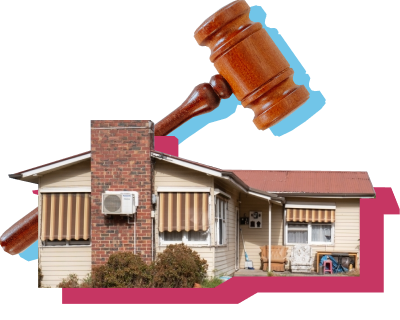Living in someone else’s house is a big responsibility (you need to look after it!).
But as a renter (commonly known as a tenant) you also have rights. Rental providers (commonly known as a landlord) and real estate agents can’t force you to do certain things. And they can’t kick you out without a good reason.
21%
of people living in sharehouses are aged between 18-24
It all starts with your ‘lease’
What is a lease?
The lease is a contract between you (the renter) and the rental provider (the owner). It is a legal document. It describes the legal agreement you have made together.
Once you sign the lease, you are saying that you have read everything inside it, and agree to what it says (even if you didn’t read it properly).
A property manager (someone who looks after rentals) from the real estate agency will most likely send you the lease to sign via email.
If you have any questions or there is something you are unsure of, make sure you ask the property manager before you sign.
Ask someone to help you read over the lease
Leases can be big documents with words you aren’t familiar with. So it can help to ask a friend for help before you sign.
You might have missed an important detail. It’s always better to be safe than sorry.
Be careful of joining a share house without joining the lease. A lack of documentation around your tenancy (and the rent you have paid) could cause problems later.
Leases and share houses
If you move into a share house, someone in the house will already have signed the lease.
It’s important you ask to go on the lease too. If you don’t do this, it could become a problem later on, and the real estate agent may be able to ask you to leave. You can arrange to go on the lease with the property manager.
Victorian Civil and Administrative Tribunal (VCAT) and Consumer Affairs Victoria are two organisations that can help you if you’re having issues as a renter.
Pay attention to the inspection report
When you first move in, the property manager will provide you with a checklist of each room. This allows you to walk through the property and record any damage you notice.
The property manager will also have the list they completed. But they may have missed something so make sure you ask to see their copy and check it’s the same as yours. This will make sure you don’t get charged for anything that wasn’t your fault at the end of the lease.
You don’t want to be responsible for any damage caused by other renters or issues that were in the property before you moved in.
You can also ask the real estate agent to do a walkthrough of the property with you before you sign the lease. Take photos or make notes if needed and send it with the completed report to the property manager. Also keep it for your records.
They will often ask for this to be returned within the first few days of you moving into the property.
Your rights as a renter
If you look after the property, respect your neighbours and pay your rent on time, you shouldn’t have any issues. But sometimes things happen that don’t feel fair.
What is a renter?
A legal term for someone who rents. If you are living in a rental property, you are its renter. A renter is sometimes called a ‘tenant’.
When something doesn’t feel fair, it’s important to get the facts. What does the lease say? What does the law in Victoria say?
Something that might feel unfair could be:
- neighbours making complaints
- maintenance going unrepaired (like a leaking tap or oven not working)
- the rent going up more than once a year.
Find out more about your rights by reading information on the Tenants Victoria website.
What are the ‘minimum liveable standards’:
- Working locks on the external doors with keys you can use
- A working kitchen sink with running water
- A stovetop with a minimum of two burners
- A bathroom with running hot and cold water
- A bath or shower and a sink
- A toilet that works
- The property must be structurally sound and weather/waterproof
- The property must meet electrical standards (working lights and no exposed wires or unsafe plugs or switches)
- Bedrooms and living areas must have curtains or blinds
- Windows must be lockable
- Adequate ventilation (airflow), especially in the bathroom
- Heating in good working condition (appropriate for the size of the space).
Keep renter records
As soon as something feels unfair, start writing it down.
Write down the dates. This will be important whenever you are talking to the real estate agent, rental provider, or people who are helping you to work it out.
Property managers are not allowed to discriminate against renters. If you feel like you have been discriminated against in any way, you can contact your Tenants Union (Tenants Victoria) for more advice and support.
Some examples of discrimination might be:
- You feel that you are being treated differently based on race, ethnicity, sexuality, gender or accessibility needs.
- You feel that you are being treated differently because you are pregnant or have children.
What laws protect you as a renter?
There are lots of laws that make sure you are treated fairly.
Rental providers (landlords) have certain legal responsibilities. They must make sure the property is safe. They must also make sure it meets basic liveable standards before you move in and during your tenancy.
There are also specific laws around pets, rent increases, bonds, evictions, broken appliances, heating, security and mould.
Your rental provider can only raise your rent once a year (usually when your lease is up for renewal).
You can decide if you are willing to pay the new amount or you may decide to move out at the end of your lease.
Learn more about the minimum standards rental providers must meet on the Consumer Affairs Victoria website.
Every Victorian should have the ability and right to be assisted in finding a home.
Your responsibilities as a renter
When you move into a rental property, you must remember: although it’s your home, someone else owns the house.
As a renter, you have a legal responsibility to keep the property as you found it when you move in.
Keeping the rental property clean and tidy
Cleaning the property, replacing light bulbs, and basic pest control is your responsibility.
Depending on your lease you may also be responsible for maintaining the garden areas or the property owner may have a gardener come. Ask your property manager if you are unsure.
The property owner is responsible for any issues with anything structural. For example, plumbing, water leaks, electricity, etc.
If you need a repair completed, you will need to let your property manager know.
Expect regular inspections
The property manager may come to do regular inspections.
Depending on where you live, it can be 2-4 times a year and they are required to give you written notice in advance of the visit.
Neither the property manager or the property owner should be turning up to, or entering the property, without notice.
If this happens you have the right to complain, either to the real estate agency or speak to Tenants Victoria.
Remember:
- Respect your rental property
- Respect your neighbours, property manager and owner
- Keep the rental property clean and tidy
- Repair minor damage and report larger damage
- If your friends damage the property, you are responsible
- If a friend wants to move in, get them on the lease
- You have rights as a renter
- Most importantly: Enjoy your new home!

Ready to put your skills into practice?
Get comprehensive guidance on what to do when things go wrong on Youth Central.




